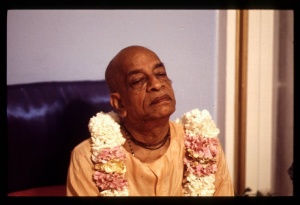CC Madhya 13.121 (1975)

A.C. Bhaktivedanta Swami Prabhupada
Below is the 1996 edition text, ready to be substituted with the 1975 one using the compile form.
TEXT 121
- yaḥ kaumāra-haraḥ sa eva hi varas tā eva caitra-kṣapās
- te conmīlita-mālatī-surabhayaḥ prauḍhāḥ kadambānilāḥ
- sā caivāsmi tathāpi tatra surata-vyāpāra-līlā-vidhau
- revā-rodhasi vetasī-taru-tale cetaḥ samutkaṇṭhate
SYNONYMS
yaḥ—that same person who; kaumāra-haraḥ—the thief of my heart during youth; saḥ—he; eva hi—certainly; varaḥ—lover; tāḥ—these; eva—certainly; caitra-kṣapāḥ—moonlit nights of the month of Caitra; te—those; ca—and; unmīlita—fructified; mālatī—of mālatī flowers; surabhayaḥ—fragrances; prauḍhāḥ—full; kadamba—with the fragrance of the kadamba flower; anilāḥ—the breezes; sā—that one; ca—also; eva—certainly; asmi—I am; tathāpi—still; tatra—there; surata-vyāpāra—in intimate transactions; līlā—of pastimes; vidhau—in the manner; revā—of the river named Revā; rodhasi—on the bank; vetasī—of the name Vetasī; taru-tale—underneath the tree; cetaḥ—my mind; samutkaṇṭhate—is very eager to go.
TRANSLATION
“‘That very personality who stole away my heart during my youth is now again my master. These are the same moonlit nights of the month of Caitra. The same fragrance of mālatī flowers is there, and the same sweet breezes are blowing from the kadamba forest. In our intimate relationship, I am also the same lover, yet still my mind is not happy here. I am eager to go back to that place on the bank of the Revā under the Vetasī tree. That is my desire.’”
PURPORT
This verse appears in the Padyāvalī (386).